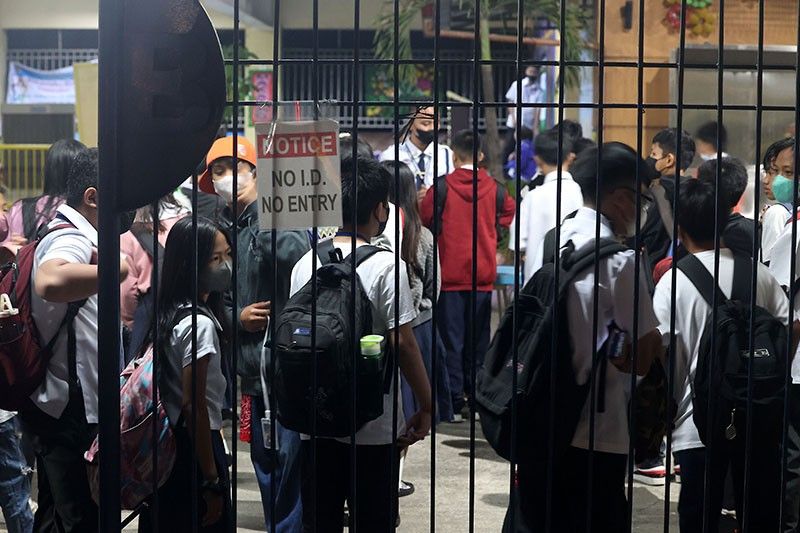Senate OKs 2 bills giving cash-strapped students relief

MANILA, Philippines — The Senate approved this week the bill prohibiting the “no permit, no exam” policy in educational institutions and the moratorium on student loan payments during disasters – two measures expected to bring relief to thousands of students facing financial difficulties.
Passed on second reading were Senate Bill 1359, the proposed No Permit, No Exam Prohibition Act, and SB 1864, the proposed Student Loan Payment Moratorium During Disasters and Emergencies Act.
Both measures are now up for third and final reading, according to Sen. Francis Escudero, chairman of the Senate committee on higher, technical and vocational education, after defending them during interpellations last March 14.
SB 1359 puts a stop to the no permit, no exam policy imposed by some educational institutions, a practice which Escudero described as the “cruelest of fines.”
The bill also prohibits the imposition of any policy in public and private schools that prevents students from taking examinations or any form of educational assessment for reasons of outstanding financial or property obligations such as unpaid tuition and other school fees.
Specifically, Section 6 of the proposed bill prohibits certain acts committed by any educational institution, including disallowing any student with outstanding financial or property obligations from taking examinations or any form of educational assessment with the rest of the student body; requiring any student to secure a permit to take an examination or any form of education assessment from the school authorities prior to the administration of such examination or assessment; compelling any student or his or her parents or legal guardians to pay a portion of the outstanding financial or property obligations prior to the administration of any examination or assessment; or imposing fines, penalties or interests on outstanding financial or property obligations.
Meanwhile, SB 1864 allows a reprieve on the payment of what tertiary students financially owe their schools when these are within the jurisdiction of a national or local declaration of a state of calamity.
Escudero was quick to note that the measure is not “loan forgiveness,” but a “payment freeze” as clearly stated in Section 5 of the bill.
SB 1864 covers loans incurred by qualified students enrolled in higher or technical-vocational education program, subject to conditions, including the residence of the student concerned is located in an area under a declared state of calamity or state of emergency.
It also provides that the moratorium shall be effective for the duration of the state of calamity or emergency and for 30 days after the lifting of such state of calamity or emergency; the availment of the payment moratorium shall not adversely affect the status of the students concerned with regard to their eligibility for re-enrollment or graduation; no penalty or interest shall be collected on the deferred payments and the imposition of student loan payment moratorium shall not prevent public or private higher education institutions or technical-vocational institutions concerned from implementing more favorable forms of payment relief or assistance to their respective students.
‘Allot 6% of GDP to education’
At the House of Representatives, Minority Leader France Castro urged the Marcos administration to allot at least six percent of the country’s gross domestic product (GDP) to address the learning crisis and severe backlog in classrooms.
The Alliance of Concerned Teachers partly-list congresswoman said her proposal is contained in House Bill No. 1783, the “Education as Priority in the National Appropriations Act,” which she filed in July last year.
The proposed measure, however, has remained pending with the House committee on higher and technical education.
Citing data from the Philippine Institute for Domestic Studies, Castro said that from 2010 to 2019, the government has only been spending the equivalent of 2.2 percent to 3.6 percent of GDP on education.
This is way below the United Nations standard for budget on education, which must be at least six percent of GDP.
For 2023, the total budget for all education agencies only amounts to 3.6 percent of GDP, with the Department of Education (DepEd)’s budget equivalent to only three percent of GDP.
“With this kind of budget allocation, it is no wonder that the education sector suffers from severe classroom shortage, meager salaries for teachers and poor academic performance of students,” Castro said in Filipino.
The Makabayan bloc member noted that with a classroom backlog of more than 165,000 at the end of 2022, the DepEd has been looking at other funding sources outside the national budget to fill the gap affecting millions of public school students.
“While the initiative of donors, both private and foreign, are welcome, the Marcos-Duterte administration must not rely on these and make it their strategy to beg for donations for our children,” she said. “It is one of the government’s primary duties to fund the education of Filipino children.”
Instead of prioritizing the huge funding for the proposed Charter change, the intelligence and confidential funds of the National Task Force to End Local Communist Armed Conflict or more foreign trips, President Marcos and Vice President and Education Secretary Sara Duterte must invest in education, said Castro.
The House had earlier projected that about P9.5 billion would be spent if a constitutional convention to amend the Charter pushes through.
“I hope that the Marcos-Duterte administration would heed our call on behalf of the education sector to increase the budget for education to six percent of the GDP and support HB 1783, to address the classroom backlogs and substantially increase the salaries of our teachers. It is only by doing this can we effectively solve the learning crisis,” Castro said. – Elizabeth Marcelo
- Latest
- Trending






























